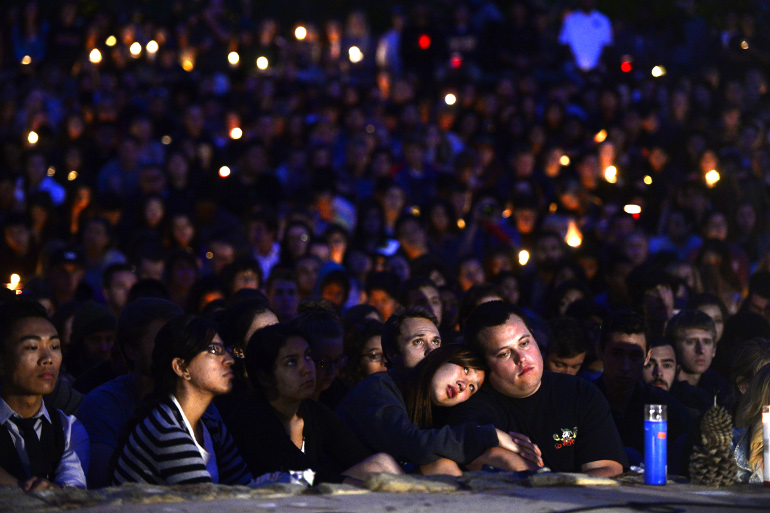
People gather at a park May 24 for a candlelight vigil for the victims of a killing rampage in the town of Isla Vista, Calif., a neighboring community of the University of California at Santa Barbara. (CNS/EPA/Michael Nelson)
Franciscan Sr. Margaret Carney, president of St. Bonaventure University in Alleghany, N.Y., wanted to believe a victim's father's outrage could make a difference after the May 23 shooting rampage near the University of California at Santa Barbara.
The day after a 22-year-old's revenge-motivated killing spree, Carney stood glued to her living room television watching Richard Martinez -- father of one of the six victims -- speak with raw anger and sadness about the need for stricter gun control laws.
His son, 20-year-old Christopher Michaels-Martinez, was walking into a deli that Friday evening in the Isla Vista neighborhood when he was fatally shot by Elliot Rodger, who also shot two others, stabbed and killed three university students and wounded 13 others before dying of an apparent self-inflicted gunshot wound to the head.
"When will this insanity stop? When will enough people say, 'Stop this madness; we don't have to live like this?' Too many have died. We should say to ourselves: Not one more," the distraught father told reporters.
Carney said if she had heard this heartfelt plea three years ago, she would have been convinced something would change.
But that was before the school shooting two years ago at Sandy Hook Elementary School in Newtown, Conn., where a 20-year-old gunman killed 20 students and six educators before killing himself.
"If Sandy Hook wasn't enough for people to march to their senators and say, 'We need a new (gun control) law tomorrow,'" she said she doesn't know what will make the difference.
That's not to say people didn't speak up after the Newtown tragedy. Five days later, 160 college presidents signed an open letter to policymakers urging tougher gun control legislation. Since then more than 400 have signed it, including a number of Catholic college presidents.
The letter's author, Lawrence Schall, president of Oglethorpe University in Atlanta, revisited the issue in a May 27 column in Inside Higher Ed, an online publication, where he chided college and university presidents for being "largely silent since Newtown on the issue of gun regulation."
He said the school shooting initially sparked a lot of discussion about college presidents' role in gun control debate but not enough action. He quoted Holy Cross Fr. Theodore Hesburgh, former president of the University of Notre Dame, who said: "How can we encourage students to speak out unless we have the courage to do so ourselves?"
Carney, a Sister of St. Francis of the Neumann Communities, feels the gun control issue is one for college leaders to take on, especially since shootings have taken place on college campuses. That's why she suggested the need for, and moderated, a panel discussion on the role of college presidents in the gun control debate at the annual conference of the Association of Catholic Colleges and Universities earlier this year.
She told Catholic News Service May 29 she knows the issue is not a simple one.
"Of course college presidents are against gun violence; no one is in favor of that. But where do you stand on Second Amendment rights? That's where conversation starts to fall apart," she said.
She also noted that college presidents all have boards of trustees that are as "divided as the nation on the best approach" to gun control, which is why she thinks the best way forward is to commit to changing attitudes through education.
She also knows such a process will take years to make an impact, so it needs to be something college leaders are committed to for the long haul. But she believes it can happen, just as public views on cigarette smoking have changed over time.
As she put it: "Legal action will fail" without public support.
Currently, public support of gun restrictions is not strong. According to Pew Research Center studies, Americans briefly showed support for gun restrictions after the Sandy Hook shooting but then soon returned to stronger support for gun rights, particularly after a background check gun bill failed in the Senate.
A lack of gun control legislation in recent years at the federal level has not been due to a lack of effort. A New York Times report last December found that 1,500 gun bills had been introduced in the U.S. since the 2012 Newtown shooting but only 109 bills became law.
Since the May 23 shooting in California, the state's lawmakers have been busy re-examining the state's gun control laws. A new bill was introduced May 28 in the state legislature that would allow friends or family members concerned that someone may commit a violent act to notify law enforcement officials. The bill also would allow police to investigate the threat and request a restraining order from a judge preventing the person from purchasing a firearm or keeping one they already own.
Bonaventure University has a somewhat similar procedure in place for dealing with "students of concern."
If a student is in emotional distress, exhibiting behaviors that could be destructive, members of the university's mental health staff, residence staff, campus ministry and faculty "come together almost instantaneously" to coordinate a plan to help the student, Carney said.
Bonaventure University also has been conducting yearly emergency safety drills since the 2007 shooting at the Virginia Tech campus when a 23-year-old student shot and killed 32 people and wounded 17 others before committing suicide.
Carney, the university's president for the past 10 years, said the practice drill is one of the "most sobering" things she does.
"It wasn't in the job description," she added.



